These 49,000-dwt tankers are the final two vessels in Proman Stena’s initial six-strong methanol-fuelled tanker fleet. The joint venture between Stena Bulk and methanol producer Proman was initially meant for three long-term time-chartered vessels but has been extended to cover three additional Proman-owned vessels.
GSI built Proman Stena Bulk’s fleet over the last three years – a period which included the Covid-19 pandemic. Executing the newbuildings during this unique period required close collaboration between Stena Bulk, Proman and GSI. It has created a blueprint for the industry to follow as it scales up methanol-fuelled shipping over the coming decade.
Both vessels are 49,990-dwt dual-fuel mid-range tankers. Once operational, the ships will consume 12,000 tonnes of methanol annually, reducing NOx emissions by 80%, virtually eliminating SOx and particulate matter, and reducing CO2 emissions by 15% on a tank-to-wake basis compared with conventional marine fuels.
Uniquely for the joint venture fleet, Stena Provident and Stena Progressive’s tanks are equipped with the industry’s best-in-class high-performance polymer MarineLINE cargo tank lining, affording them greater cargo flexibility.
This final naming ceremony for the last vessels in the joint venture’s initial fleet means Proman Stena Bulk’s tankers now account for one quarter of the currently operational methanol-fuelled ships on the water, according to data from shipbroker Clarksons.
Tags: Methanol, Proman Stena, Tankers



Recent Posts
Amogy Accelerates Commercialization of Ammonia Cracking Catalyst in Partnership with JGC
Europa Technologies announces partnership with Twinn
IAC raises the question on India’s absence in LPG autogas vehicles
Montra Electric and Magenta Mobility forge partnership for sustainable logistics solutions
Union Minister Pralhad Joshi visits Greenko’s integrated renewable energy storage project
Government aims at 30% ethanol blending with petrol by 2030
Rio Tinto and AMG Metals & Materials to assess low-carbon aluminium project in India
Gasum selects Wärtsilä for another bioLNG project in Sweden